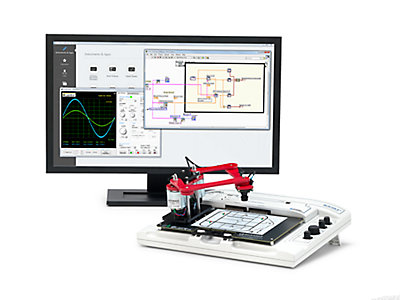New NI ELVIS RIO Control Module adds FPGA RIO technology for enhanced hands-on learning
AUSTIN, Texas – August 23, 2016 – NI (Nasdaq: NATI), the provider of platform-based systems that enable engineers and scientists to solve the world’s greatest engineering challenges, announced today the NI Educational Laboratory Virtual Instrumentation Suite (NI ELVIS) RIO Control Module, the newest addition to the powerful NI ELVIS product family. The NI ELVIS RIO Control Module adds an industry-leading, real-time embedded processor and FPGA architecture to instrumentation powering NI’s most complete hands-on learning solution for power systems, machine control, hardware in the loop and mechatronics design.
With the NI ELVIS RIO Control Module, the NI ELVIS II/II+ ecosystem now integrates FPGA technology with a comprehensive set of measurement instruments in a singular, compact form factor developed specifically for the lab or classroom. This new functionality joins an expanding ecosystem of add-on accessories and courseware from partners such as Quanser to deliver a complete teaching solution for the lab.
“I can have students design and run lab experiments on the NI ELVIS RIO Control Module and have them troubleshoot sensors and actuators at the circuit level to use in those experiments with the NI ELVIS instrumentation,” said David McNair, professor at Georgia Institute of Technology. “This helps students understand and appreciate the need for instrumentation in troubleshooting and embedded processors for design as well as the importance of using them together when developing projects and experiments.”
The NI ELVIS ecosystem merges hardware, software and courseware in a complete education platform for a broad set of topics such as electronics, mechatronics and communications. With the new control module and add-on boards, students can rapidly explore new fundamental theories behind in-depth subjects as well as system-level applications in the context of a larger system. As a result, students can quickly bridge the gap from learning theory to applying these concepts to real-world applications.















